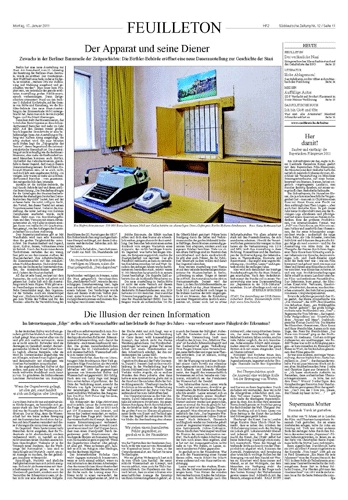Press File
SUDDEUTSCHE ZEITUNG - January 17, 2011

SÜDDEUTSCHE ZEITUNG
Montag, 17. Januar 2011
FEUILLETON — FRONT PAGE
DIE ILLUSION DER REINEN INFORMATION
Im Internetmagazin 'Edge' stellen sich Wissenschaftler und Intellektuelle der Frage des Jahres - was verbessert unsere Fähigkeit der Erkenntnis?
THE ILLUSION OF PURE INFORMATION
On The Internet Magazine "Edge", Scientists And Intellectuals Are Presented With The Question Of The Year — What Improves Our Ability To Achieve Enlightenment?
Ralf Bont
... In the Anglo-Saxon culture things are different, and science certainly has continued in its global appeal. Thus, early English modern naturalism, founded by Humphry Davy, had a reputation not only for spectacular discoveries, they also for paying attention to public communication. The goal was the transfer of knowledge into the auditorium. This is clever, because science has, as much as any other movement since the French Revolution, changed the lives of everyone on the planet and it has by no means lost this position of leadership.
On the contrary. Today when more and more people assume that the death penalty does not have a deterrent effect, it's not a new belief in a higher justice. Rather, it is the triumph of that thinking that the tools of rationality — language logic and statistics — are being used to make a statement that contradicts the common assumptions.
It is, however, necessary to acquire language logic, statistics and other skills. Do not give a claim to power with a fath-based knowledge, but also mediate what knowledge is. This is not only an honorable task — it pplaces scientific researchers in the realm of medical doctors who take the Hippocratic oath. Knowledge is vital, and — this is the flip side — knwoledge can be abused: the great anti-human ideologies of the 20th Century were themselves scientific. The science community needs to communicate better.
It's ever more delectable that the Edge Foundation— the network of prominent scientists and intellectuals founded by literary agent John Brockman in New York — has worked against the reciprocal ignorance of literary cultures and sciences of each other. Successfully. If you take the algorithms developed by Larry Page and Sergey Brin, which measure the value of links, Edge's website ranks seven on a global scale of ten. The New York Times ranks nine, eBay at eight.
A highlight of the Edge's activities in each January, the answers to the question of the year. In 2010 there were more than 130 short essays on how the Internet is changing the way we think. The question now presented by Edge: What scientific concept woud improve everyone's cognitive tookiit?
